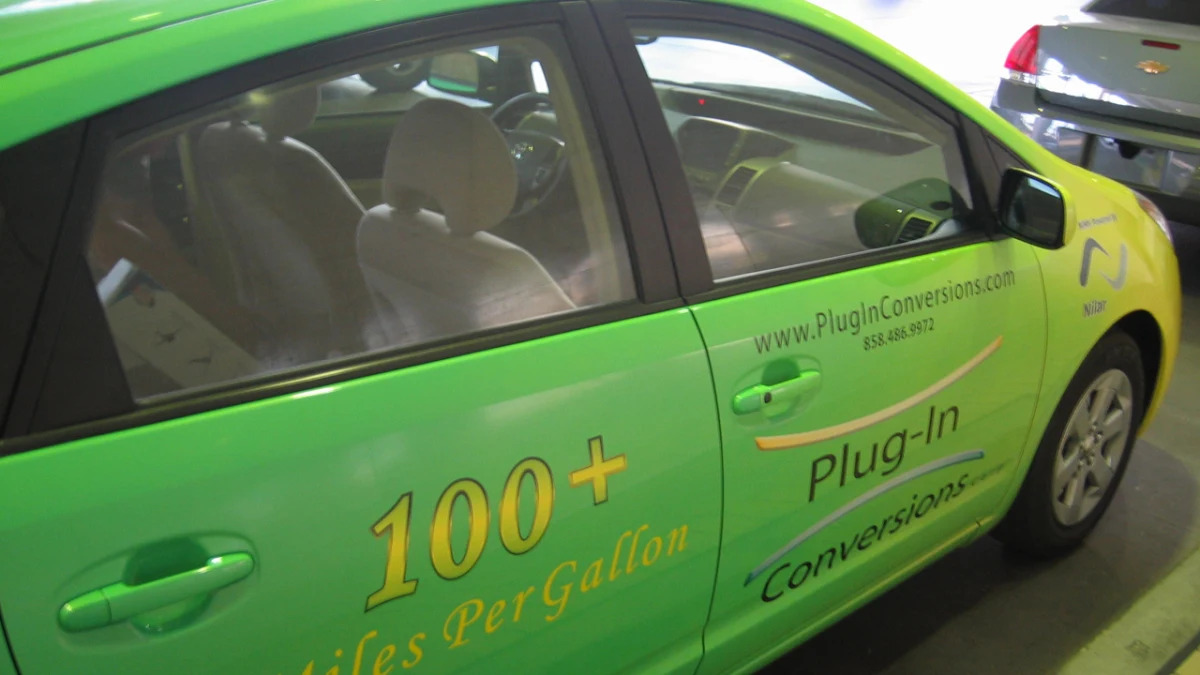Photo by gailf548. Licensed under Creative Commons license 2.0.
Over the weekend, I met a guy at a party who's been a mechanic for the last 15 years. Once we told each other what we do with our workdays, we naturally fell into a conversation about cars and green technology and the like.
As part of our chat, he said something that struck me as pretty right-on. We hear a lot from auto company executives and media relations here at AutoblogGreen, and we hear from our share of clean car advocates and drivers fed up with gas prices. But mechanics? We don't hear a lot of their voices. But we should; as the guy told me, whatever the car companies make will one day break, and he's the guy who needs to put those vehicles back on the road.
Twenty years ago, auto repair was a skill that you could learn from a book or someone who'd been doing it for a while. Today, though, on top of the basic understanding of how a vehicle works, you need all sorts of diagnostic equipment and computers just to figure out what's wrong with the truck on the lift. Then, to fix most problems, you need to make an investment in equipment and time that's so high it's pushed most home mechanics out of the hobby. Oil changes? Sure. Swapping out a hybrid battery pack? Maybe if you're Kim Adelman.
Over the weekend, I met a guy at a party who's been a mechanic for the last 15 years. Once we told each other what we do with our workdays, we naturally fell into a conversation about cars and green technology and the like.
As part of our chat, he said something that struck me as pretty right-on. We hear a lot from auto company executives and media relations here at AutoblogGreen, and we hear from our share of clean car advocates and drivers fed up with gas prices. But mechanics? We don't hear a lot of their voices. But we should; as the guy told me, whatever the car companies make will one day break, and he's the guy who needs to put those vehicles back on the road.
Twenty years ago, auto repair was a skill that you could learn from a book or someone who'd been doing it for a while. Today, though, on top of the basic understanding of how a vehicle works, you need all sorts of diagnostic equipment and computers just to figure out what's wrong with the truck on the lift. Then, to fix most problems, you need to make an investment in equipment and time that's so high it's pushed most home mechanics out of the hobby. Oil changes? Sure. Swapping out a hybrid battery pack? Maybe if you're Kim Adelman.
Now, introduce flex-fuel systems, high-power NiMH or lithium ion batteries (or even ultracaps) and complex hybrid systems to the mix. What do you do then? Follow me after the jump for a few thoughts on what may be coming down the road.
My new mechanic friend told me that each time gas prices jump up, people come into his shop with problems caused by supposed fixes for low-mileage vehicles. We've written about some of these - the special spark plugs and the tailpipe magnets promoted by Erin Brockovich - and we're pretty skeptical of the claims that some people make about their amazing products. Buy now before they're banned, and all that jazz. The mechanic (I guess he's not actually my friend, since I've forgotten his name. Sorry) told me that not too long ago, a guy driving a Ford F-150 (I think) came into the shop because his power steering had stopped working. One look and the discovery (and removal) of some of those fuel line magnets that are supposed to dramatically increase your MPGs later and the power steering was back to normal. These are things the repair shops in the U.S. are dealing with today. What about tomorrow?
If you're an auto mechanic, your job is pretty secure. That's almost a given. But things get a bit murky when we ask what kind of mechanic will you be in fifteen years? If you're a garage owner, your choices are getting pretty staggering - and you don't want to bet on the wrong horse. Do you invest in the computers that can talk to flex-fuel sensors? Do you train your mechanics to learn how to handle hybrid systems or hire new ones who already know these skills? You won't need to fix vehicles that are brand new today until early into the next decade - plus all of the cars on the road today will still need repair until they make it to the great recycling center in the sky - but change is coming, without a doubt. And what about hydrogen?
Let's look at how one of our favorite subjects on this blog - Tesla Motors - is handling the situation. Tesla Motors is looking for a mechanic (excuse me, Vehicle Technician) in their San Carlos, CA location. Why in San Carlos? Because when one of the Roadsters has a problem, the car will be shipped to a Tesla service center (which I think will only exist in LA at first, although Tesla considers San Francisco, Chicago, New York, and Miami to be their initial key markets, so we can expect centers there, too, at some point) for repair. If you live far away from a center when you buy the car, there is an $8,000 service fee for the shipping. This is just one example, but it points out the fact that local repair shops might not be much use in an EV world. Not yet anyway.
So, what did my conversation partner say that sounded so right on to me? That local, independent shops will soon cease to exist. It is his opinion that only dealers will be able to service the increasingly complex alternative-fueled vehicles in the coming decades, because they'll be the only ones with the technical know-how to repair the new breed. Dealerships will also be the only ones with the funds to buy the new diagnostic computers to test a failing Continental battery in the Volt, say, or the plug-in system of a 2015 Prius.
Now, I've been wondering what other changes our move away from today's "standard" engines will have on our economy and lifestyle, apart from the hopefully cleaner environment we'll all have. I'll leave those thoughts on the back burner for a little while longer and see what your thoughts are on this topic. Will we soon see the last of the local, independent mechanics? Will some new sort of garage type pop up to take their place? What do you expect your local mechanic options to be in 15-20 years? And will they still like donuts?





Sign in to post
Please sign in to leave a comment.
Continue